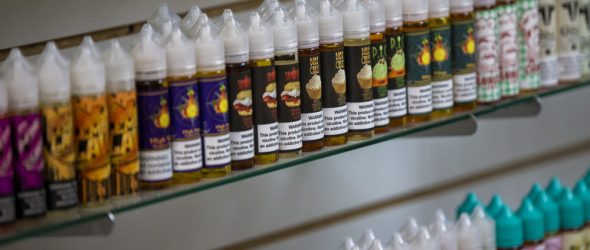As the governor’s ban on the sale of vaping products lifted at noontime Tuesday for medical marijuana patients, the Cannabis Control Commission stepped in and ordered a quarantine of all marijuana vaping products except those that vaporize flower for medical patients.
The indefinite quarantine of all “marijuana products and devices that rely on vaporization or aerosolization, including, but not limited to, vape pens, vape cartridges, aerosol products, and inhalers” will keep oil-based vaping cartridges off the shelves of marijuana stores, even for medical marijuana patients.
CCC Executive Director Shawn Collins ordered the quarantine “based on his determination that these products pose an immediate or serious threat to the public health, safety or welfare and the quarantine is necessary to protect the public health, safety or welfare.”
The order also states that Collins “has determined that additional testing of certain products for vitamin E acetate and other substances of concern and the development of additional regulatory and policy safeguards is necessary to protect the public health, safety and welfare.”
Superior Court Judge Douglas Wilkins ruled last week that the CCC, not the Department of Public Health, has the sole authority to regulate the sale of marijuana vaping products for patients and gave the agency a week to either adopt its own emergency regulations to keep the ban in place or take some other action. The CCC last week affirmed Collins’ authority to order a quarantine and he suggested that he was “leaning toward” a quarantine of oil-based cartridges.
“If (the ban) were to be lifted, I would have every intention of deploying any tool that we have to ensure that product that may not be safe for consumers or patients does not reach the marketplace,” Collins said during the meeting.
The quarantine, which is to remain in effect until the CCC amends or rescinds it, comes on the heels of the U.S. Centers for Disease Control announcing that its investigation into the nationwide rash of vaping-related lung illnesses has found “direct evidence of vitamin E acetate at the primary site of injury within the lungs.”
The CCC said its current testing regulations and protocols “do not require testing for vitamin E acetate,” which is thought to be added to some oil-based vaping cartridges as a filling agent.
“Based on current manufacturing processes, it is possible that legal marijuana products sold in the state could contain vitamin E acetate or other potential ingredients of concern,” the CCC said in a statement. It added that it is in talks with its testing labs “to understand their capability of testing for ingredients such as vitamin E acetate.”
The CCC added a requirement in its most recent round of regulation rewriting that all vaporizer cartridges, marijuana extracts and concentrates sold in Massachusetts come with a more detailed list of the chemicals and ingredients they contain. The specific requirement is that marijuana product labeling also list “the amount of any specific additives infused or incorporated during the manufacturing process, including, but not limited to, thickening agents and specific terpenes, expressed in absolute terms and as a percentage of volume.”
Up until that point, the CCC’s rules for the marijuana industry had only required the ingredient list to include information about the cannabinoid profile of the marijuana and its THC content.
During the quarantine, all licensed marijuana businesses are required to quarantine vaping products in the state’s mandated seed-to-sale tracking system and the CCC suggested that its upcoming round of regulatory revisions “will be open to public comment and focus on the requirements for extracts, concentrates, and any accessories or devices used for vaporizing marijuana.”


